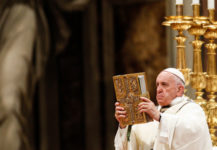Should Pope Francis Have Made Comments After Pell’s Acquittal?

‘Empty streets and eerie silence greet George Pell’s final verdict,’ read the headline from the Guardian’s coverage of George Pell’s High Court acquittal this week.
And how telling those words are. If we weren’t all preoccupied with the immediate and present danger presented by COVID-19, then the surrounds of the Brisbane High Court would have been full of protesters and interested by-standers on the day the full bench delivered its unanimous judgement.
But as it stands, the High Court’s 7:0 decision is one of the most polarising in Australian history.
In the hours that followed, and without specifically referring to the decision or Mr Pell, Pope Francis told a congregation, “I would like to pray today for all those people who suffer unjust sentences resulting from intransigence”. For its part, the Vatican issued a statement praising Mr Pell for having “waited for the truth to be ascertained”.
Prosecutions are rare
Despite the outcome, having a senior Catholic figure brought before a jury over allegations of historical child sexual abuse can be seen as a noteworthy feat in itself.
Of the 78 Catholic bishops worldwide who have been publicly accused of child sexual abuse, very few have faced criminal charges, and fewer than 10 have been tried in a secular courtroom.
But, historical sexual offences can be difficult to prosecute due to organic factors such as the deterioration of memory and difficulties in obtaining evidence, which can make it hard for allegations to prove beyond a reasonable doubt.
Beyond a reasonable doubt?
In the Pell case, the credibility of ‘Witness A’ was accepted by the jury.
And while the testimony itself has been suppressed, those who were privy to the jury trial have consistently reported that the evidence was compelling, that the trial judge made lengthy directions to the effect that the account of Witness A must be scrutinised very carefully before it could be accepted as the truth and that, at all times, that the prosecution bore the onus of proving guilt beyond reasonable doubt.
By all accounts, due process was followed. And the original ‘guilty’ verdict was seen as a victory for victims of child sexual abuse everywhere – one which might get them to come forward and have confidence in the justice system. It was a unanimous verdict; in other words, all of the jurors came to the same conclusion regarding guilt – the judge was not required to direct the jury that they could come to a majority verdict, which often happens when jurors are in disagreement after lengthy deliberations.
But many seen the resounding judgement of the High Court as potentially having the opposite effect on victims– that it could cause them to be reluctant to come forward.
Why not a retrial?
What is not clear, is why the High Court entered verdicts of acquittal rather than have the matter remitted for re-determination in accordance with the law – in other words, why a retrial was not ordered, during which the law could be properly applied. It was certainly a legal option available to the Court, and one which might have caused people to ‘keep the faith’ when it comes to the legal system.
It’s a question we may never know the answer to. But what is clear is that the Pell decision has potentially far-reaching social consequences.
George Pell has an international profile as a senior member of the Catholic Church, and he is the highest ranking church official ever to be found guilty of child sex offences in a court of law, despite his subsequent acquittal. Both of these facts combined mean that like it or not, George Pell has, in many ways, become a symbol for the atrocities perpetrated by Catholic priests against tens of thousands of children around the world.
The recent Royal Commission into Institutional Responses to Child Sexual Abuse recorded more than 4,400 cases of child sexual abuse within the Catholic church in Australia alone – allegations involving 1800 church figures – and commentators suggest there may be thousands more who have not come forward.
Many have spoken in recent days about the ‘futility’ they feel about making formal complaints, of having to ensure stress and emotional pain, only to be let down by the system.
How will the Catholic Church respond?
There has been a flood of complaints against Catholic Priests in recent years, alleging sexual abuse of children and nuns over many decades, and claiming that the church itself has instilled and perpetuated a culture of covering this up, of hiding evidence, and of outcasting the victims and their families as liars and ‘betrayers’ – both of the faith, and the institution.
There was a glimmer of hope in 2018, when Pope Francis declared ‘zero tolerance’ for child abuse within the church. Even though he has been slow to act, this powerful statement and a number of other decisive moves such as defrocking a priest guilty of child abuse, were encouraging signs that the Church was acknowledging its dark and dirty history and considering important changes.
But in the hours after George Pell’s acquittal, the Pope’s message was very different. He spoke instead of ‘unjust sentences’ and the suffering endured by those because ‘someone had it in for them.’ His speech left many questioning whether there will ever be real recognition of, and proper redress for, victims. Given the timing of those words is it a legitimate concern that now Pell has been acquitted the church too, feels entitled to absolve itself completely? Only time will tell.
The legal fight is not over
The criminal case against George Pell is now over, but there are still some important court cases to come. Civil lawsuits will proceed. New laws introduced last year make it possible for victims to sue the Church and these suits are not dependent on the outcome of the criminal trial.
Numerous civil suits have been filed against Pell – by complainants who say they themselves are victims of his abuse, and by others who say that he did not protect them from the abuse of others even when he knew it was occurring and had the power to stop it.
The Royal Commission also made findings relating to Pell, with particular regard to what he knew about abuse occurring by clergy, but these have been heavily redacted because criminal proceedings have been underway. The release of the redacted findings is expected in the coming weeks.






